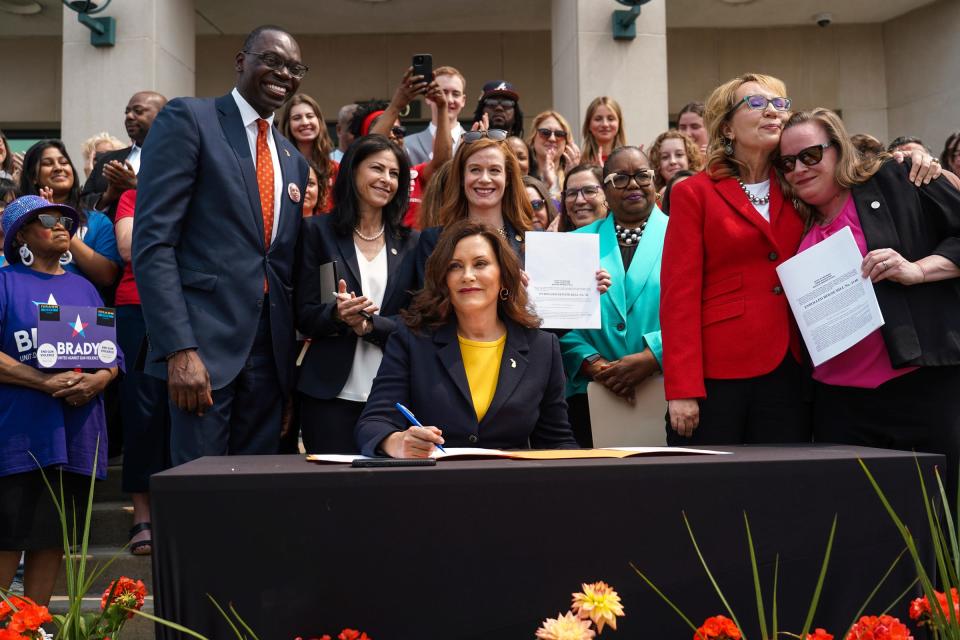Michigan Democrats to adjourn early, enabling Feb. presidential primary
- Oops!Something went wrong.Please try again later.
LANSING – The Michigan Legislature will adjourn for the year earlier than any group of state lawmakers in 55 years.
Thursday was the last day this year that lawmakers took action on bills. Among the final moves they made, lawmakers sent to the governor legislation to implement financial disclosure requirements for politicians and a ban on institutional desecration advocates say will tackle incidents of vandalism and other threats at facilities like schools and places of worship.
Technically, next week will officially mark the end of the 2023 legislative session. The House and Senate adopted a resolution to adjourn sine die Tuesday at noon.
The last time the Legislature adjourned prior to December was more than half a century ago when lawmakers left Lansing for the year on Aug. 16, 1968. But even with an early adjournment, this Democratically-controlled Legislature still met for more session days than some previous legislatures that adjourned later in the year.
"I will put the work that we've done this year up with any legislative session in Michigan’s history," House Speaker Joe Tate, D-Detroit told reporters. Asked to explain Democrats' decision to adjourn early, Majority Leader Winnie Brinks, D-Grand Rapids, echoed Tate. "We felt like we've had an incredibly productive year. We got a lot of things done," she said.
Tuesday will start the 90-day clock for putting into effect Democratic bills that didn't receive enough Republican support to take effect immediately. That includes legislation changing the date for Michigan's 2024 presidential primary election.

At the start of the year, Democrats — who control the Legislature for the first time in 40 years — worked quickly to pass legislation moving up Michigan's presidential primary date from the second Tuesday in March to the fourth Tuesday in February. Michigan Democrats have long sought to become one of the party's early primary states, and this time, they had the backing of President Joe Biden, who recommended making Michigan among the first states in the country to hold its Democratic primary as he seeks reelection in 2024.
Minority Leader Aric Nesbitt, R-Porter Township, blasted Democrats for adjourning early in a floor speech. "You have shown the people in Michigan where your loyalties lie, but the most prominent example of your one-sided partisan agenda that has led to your push to leave town early came at the beginning of the year when a certain presidentially ambitious Governor ordered you to change Michigan's presidential primary," Nesbitt said, referencing speculation that Whitmer could one day run for president. Brinks, D-Grand Rapids, fired back and said Republicans could have voted with Democrats to give immediate effect to various policies adopted by the chamber.
On a party-line vote earlier this year, Democratic state lawmakers changed Michigan’s election law to hold the 2024 primary on Feb. 27. It was the first policy bill signed into law by Gov. Gretchen Whitmer this year.
Without any GOP support, it would have taken effect too late if Democrats stuck to the typical legislative schedule and adjourned in December. Brinks called moving the presidential primary earlier a "cherry on top" stemming from Democrats' early adjournment. "But I will tell you I was not eager to adjourn early, if that were the only reason, I'm not sure we'd be here," she said. She pointed to a bevy of other Democratic priorities that lacked GOP support that will also take effect sooner.
Lawmakers meet their end-of-year deadline on Proposal 1 implementation
Lawmakers spent the final days of session working toward one big end-of-the-year deadline they had to meet: a requirement in the Proposal 1 ballot measure adopted by voters last year to enact financial reporting requirements for lawmakers and top statewide officeholders by Dec. 31.
In a dramatic 2:30 a.m. vote, the state House approved the implementing legislation. The Senate sent the bills criticized by some transparency advocates as inadequate to Whitmer on Thursday afternoon.
Tate called the early morning vote "a giant leap."
"I mean we were able to move the needle significantly. We're actually starting to become more on par with other states across the country," Tate told reporters.
State Sen. Jim Runestad, R-White Lake, voted against the package, saying the transparency measures adopted by the Legislature before adjournment were an attempt to stave off meaningful reforms. "That's what the majority has produced, mostly hot air," he said during a floor speech.
How late could lawmakers have worked?
Lawmakers were initially scheduled to work for another nine session days — with an additional three session days tentatively planned — before the end of the year.
It was ultimately a schedule that was incompatible with holding a February presidential primary given Republicans' lack of support for the election date change. In theory, the Democratically-controlled Legislature could still have waited to adjourn for the year until Nov. 29 and still have left enough time for the legislation changing the primary date to take effect by Feb. 27.
Democrats to temporarily lose majority after early adjournment
Like Nesbitt, Minority Leader Matt Hall, R-Richland Township, also criticized Democrats' decision to adjourn early.
Two Democratic state representatives' recent victories in mayoral races leave the state House with an even partisan split. Hall said that he's ready to start "cranking" out bipartisan legislation with Democrats having temporarily lost their majority in the chamber. He said Tate should broker a "shared power agreement" with him to work out how both parties could work together.

Under House rules, Democrats still have control of the chamber even with 54 Democrats and 54 Republicans serving. Tate made that clear in responding to Hall's call. "We're not in shared power. Democrats still control the gavel," Tate said.
Hall countered: "It doesn't matter who controls the gavel if you're going home with it and you're not governing and getting work done for the people of Michigan."
Other bills slated to take effect in 90 days
The presidential primary date change isn’t the only legislation signed by Whitmer that will take effect slightly sooner due to early adjournment. So will other Democratic measures that didn't gain enough GOP support to take effect immediately.

That includes an expansion of the state’s civil rights law to explicitly bar discrimination based on sexual orientation, gender identity and gender expression consistent with a previous Michigan Supreme Court ruling; a repeal of the state’s right-to-work law allowing those in unionized jobs to opt out of paying union fees and dues, and gun safety legislation.
"We have to be able to start enacting things that we've been working on," Tate said. "We want to be able to actually have these policies that we've been talking about that put people first actually get down and have an effect on their lives as soon as possible."
Lawmakers pass some, not all of Whitmer's legislative agenda
Lawmakers moved quickly at the start of the year to check off legislative priorities Whitmer laid out in her annual State of the State speech delivered right after Democrats secured majorities. On the heels of Democratic policy victories, the governor gave another speech laying out her next set of policy goals before lawmakers returned for the fall.
Lawmakers delivered on some of those items.

Whitmer signed into law bills to codify in state law health care protections in the federal Affordable Care Act. The Legislature also passed legislation to establish a 100% clean energy standard and a "Reproductive Health Act" aimed at expanding abortion access.
But other Whitmer priorities stalled before lawmakers headed home for the end of the year. Lawmakers in the state Senate passed legislation to establish a prescription drug affordability board but the state House didn't take up those bills. And lawmakers held no committee hearings on paid family and medical leave, a proposal backed by Whitmer.
Contact Clara Hendrickson: chendrickson@freepress.com or 313-296-5743. Follow her on X, previously called Twitter, @clarajanehen.
This article originally appeared on Detroit Free Press: Michigan Democrats to adjourn early

